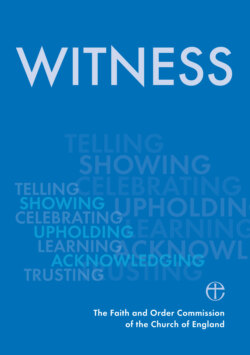Читать книгу Witness - The Faith and Order Commission - Страница 10
Learning to communicate
ОглавлениеAt the end of his life, Joshua erected a stone in the sanctuary at Shechem as a witness – a standing reminder of God’s covenant with God’s people.7 Witness can take the form of an event, an interruption, a cry: an intervention in a particular situation that calls attention to God’s gracious love and the demands that it makes. And witness can also take the form of a steady presence, a faithful persistence, like that of a standing stone.
Yet even when it takes the form of a surprising intervention, witness cannot be a hit-and-run affair. In John 6, we see a moment of misrecognition. A large crowd is following Jesus, ‘because they saw the signs that he was doing for the sick’, and they try to ‘take him by force to make him king’.8 They make sense of Jesus within their existing expectations, and so mistake the kind of king he is. That is perhaps why Jesus repeatedly instructed people not to spread the news that he was the Messiah.9 Anyone in his culture who was simply told that message was bound to get the wrong idea, because they would not yet have the language, the expectations, that would allow them to hear what it really meant. There was therefore, for most people, no quick way for Jesus to share this message with them. They needed to spend time with him, to hear his words and see his actions, to follow his story through, in order to make sense of him.
We can’t witness without developing together some kind of shared language that will allow us to communicate with one another. That is often a slow process, and one that requires attentiveness and sensitivity.
It can’t happen if we don’t pay close attention to the language, the patterns of life and understanding, of those amongst whom we are witnessing. And so we can’t truly witness to people without spending time with them, and being drawn deeply into relationship with them.
That might sometimes mean that we invite people into encounter and engagement with us. It will also sometimes mean that we accept invitation into encounter and engagement with them. Sometimes it will simply mean a development of the relationships in which we already find ourselves, and it won’t be clear who invited whom, or who is guest and who is host. We won’t always – perhaps we won’t even normally – be the hosts as we learn to witness.
One thing we can be sure about, though. Learning to witness is a process that will change us, perhaps far more than we expect. As we learn to communicate with others the love of God in word and action, we will learn to know that love in new ways – and we will become, once again, recipients. We will be drawn back to worship – to gratitude, adoration, and delight, and to penitence, lament, and petition – as we receive the gift of God’s love afresh from those amongst whom we are witnessing.
